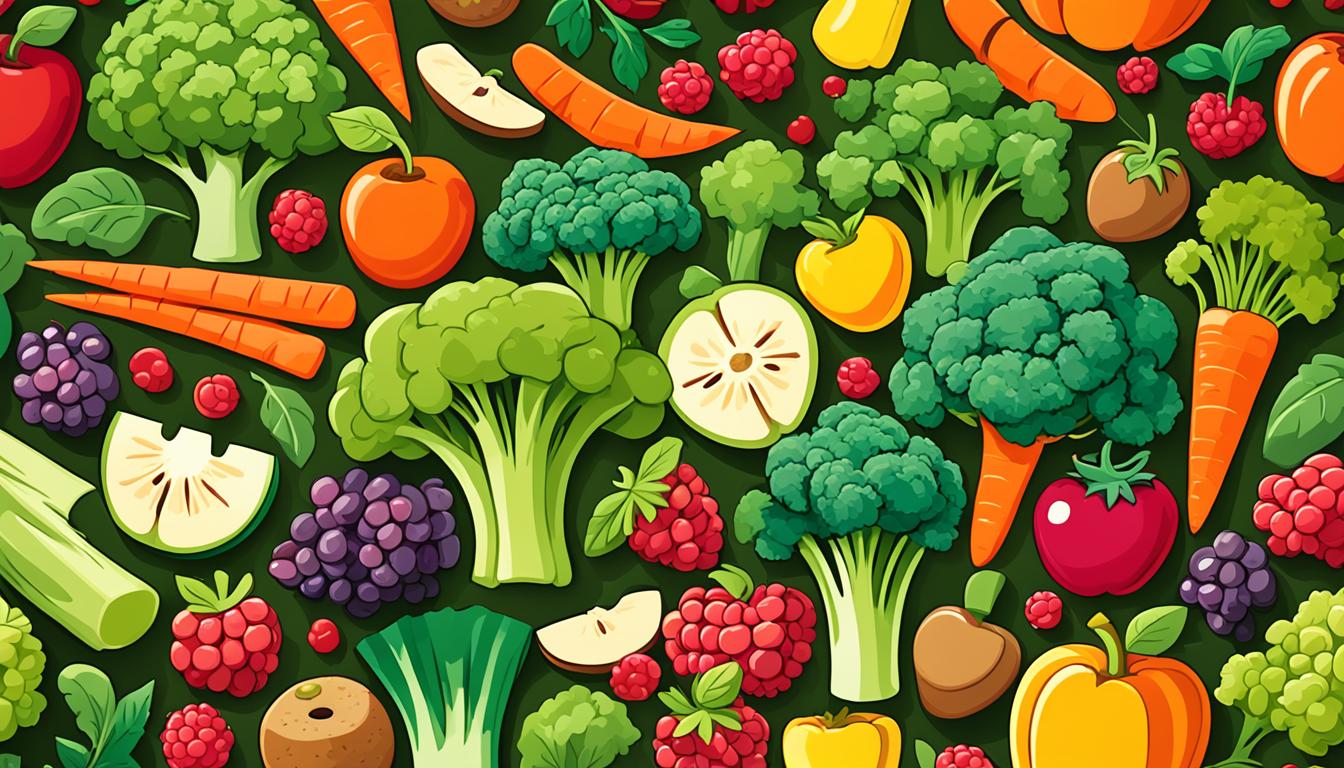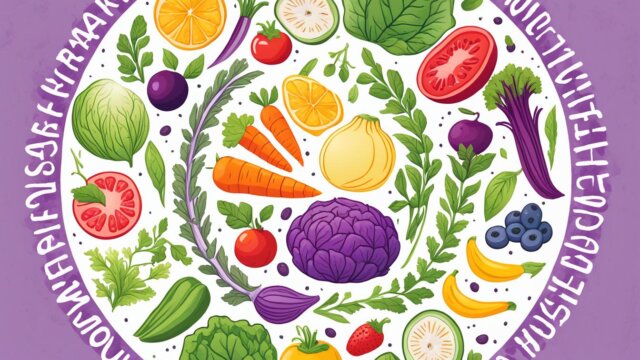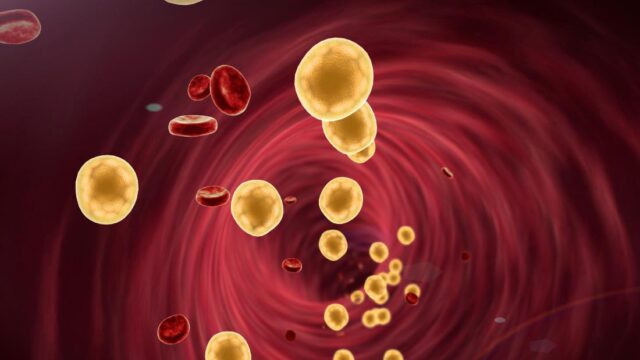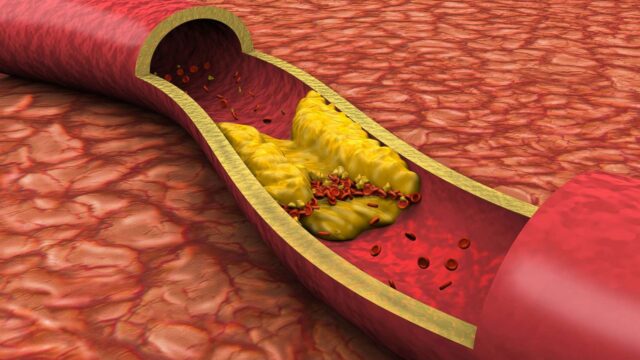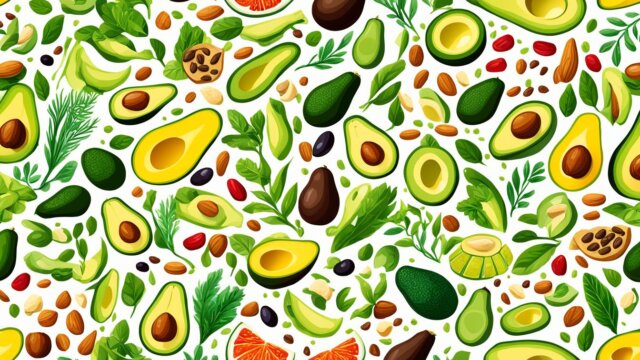FTC disclaimer: This post may contains affiliate links and we will be compensated if you click on a link and make a purchase.
Did you know 95% of Americans don’t get enough fiber? This nutrient is key for a healthy gut. Getting enough fiber helps with more than just digestion. It can lower the risk of dying early, help with weight and blood sugar control. This guide will show you how to use fiber to keep your gut healthy and boost your overall health.
Key Takeaways
- Dietary fiber is essential for gut health and overall well-being.
- Fiber helps with bowel movements, protects the digestive system, and aids in weight management.
- Guidelines suggest 14 grams of fiber per 1,000 calories, with different needs for different ages.
- Eat a mix of high-fiber foods like fruits, veggies, beans, and whole grains to get enough fiber.
- Improving gut health with fiber and other lifestyle changes can greatly benefit your health, both physical and mental.
What is the Gut Microbiome and Why is it Important?
The gut microbiome is full of trillions of tiny living things like bacteria and viruses. They live in our digestive tract. These tiny friends help keep us healthy. They also help our immune system, our mood, and lower the risk of chronic diseases.
The Significance of Gut Health
Studies show that our gut microbiome is very important. If it gets out of balance, it can cause many health problems. This includes mental health issues, autoimmune diseases, and even some cancers. We need a healthy gut microbiome for good health.
How the Gut Microbiome Impacts Overall Health
The gut microbiome does many important jobs. It keeps our immune system strong, helps us absorb nutrients, and even talks to our brain. If our gut microbiome is unhealthy, we might get chronic diseases like obesity or diabetes.
What we eat and our lifestyle can change our gut microbiome. Eating too much sugar and fat can make our gut less healthy.
“A diverse and thriving gut microbiome is associated with improved overall physical and mental well-being.”
7 Signs of an Unhealthy Gut
An imbalance in your gut can cause many health problems. It can lead to digestive issues and weight changes. Knowing the signs of an unhealthy gut is key to fixing it. Let’s look at seven common signs you might need to focus on your gut health.
Digestive Disturbances
Do you often have gas, bloating, or stomach pain? This could mean your gut is out of balance. This imbalance can make it hard for your body to digest food properly. It’s called dysbiosis, a problem with the gut bacteria.
Excessive Sugar Consumption
Eating too many processed foods and sugars can hurt your gut. Too much sugar can harm the good bacteria in your gut. This leads to more inflammation in your body. Foods with a lot of sugar, like high-fructose corn syrup, can cause inflammation too.
Unintentional Weight Fluctuations
Weight changes without trying can mean your gut is not healthy. An unhealthy gut can make it hard to absorb nutrients and control blood sugar. This can lead to weight gain or loss. SIBO can cause weight loss, while insulin resistance can make you gain weight and increase the risk of Type-2 diabetes.
Knowing these seven signs of an unhealthy gut helps you take action. You can improve your gut health and overall well-being. Stay tuned for more on how to make your gut healthier.
Strategies to Improve Gut Health
Keeping your gut healthy is key to feeling good and staying well. Stress can hurt your gut health. To help, try stress-reducing activities like meditation, yoga, or being in nature.
Prioritizing Quality Sleep
Good sleep is vital for a healthy gut. Bad sleep can mess with your gut bacteria, making you tired all the time. Make sure to sleep well by sticking to a routine and making your bedroom sleep-friendly.
Eating Mindfully and Staying Hydrated
What you eat affects your gut health a lot. Eating too much junk food can harm your gut’s good bacteria. Eat slowly and chew well to help your digestion. Drinking enough water is also good for your gut.
Gut Health Strategies | Benefits |
|---|---|
Stress Reduction Techniques | Help support a healthy gut by reducing the impact of chronic stress on gut health |
Prioritizing Quality Sleep | Improve gut bacteria balance and reduce fatigue associated with sleep disturbances |
Eating Mindfully and Staying Hydrated | Support better digestion, nutrient absorption, and increased gut bacteria diversity |
Using these tips can help you improve your gut health and feel better overall.
“A healthy gut is the foundation for a healthy body and mind.”
The Role of Prebiotics and Probiotics
Prebiotics and probiotics are key for a healthy gut. Prebiotics feed the good bacteria in your gut, helping them grow. Probiotics are live bacteria you can eat in foods or take as supplements.
Studies show probiotics are good for your health. A 2022 study found they help your immune system and fight obesity. Another study in 2019 linked them to less depression and anxiety. They also make vitamin K and short-chain fatty acids, important for your colon.
But, harmful bacteria can make you gain weight. Antibiotics can change your gut bacteria, leading to antibiotic resistance.
Eating foods rich in prebiotics and probiotics is good for your gut. Foods like beans, bananas, and asparagus are prebiotic-rich. Yogurt and sauerkraut are good for probiotics. But, not all probiotic supplements work the same.
Some people with SIBO or IBS might not do well with probiotics or prebiotics. But, some probiotics can help with IBS symptoms. The World Gastroenterology Organization suggests probiotics for certain health issues.
Prebiotic-Rich Foods | Probiotic-Rich Foods |
|---|---|
|
|
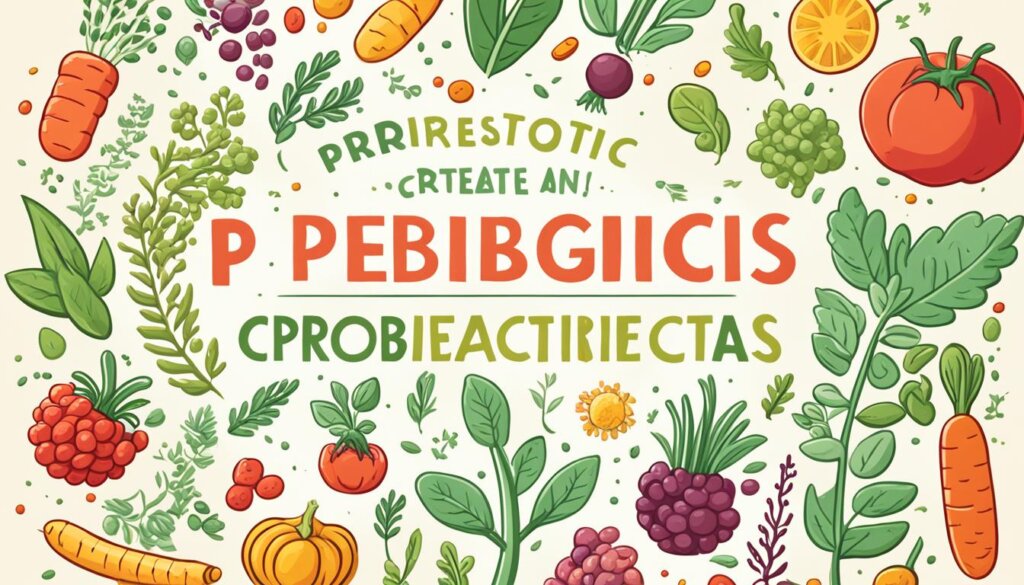
Prebiotics and probiotics work together to support a healthy gut microbiome, leading to numerous health benefits.
“Maintaining a balanced gut microbiome is crucial for overall health and well-being.” – Dr. Jane Smith, Gastroenterologist
Identifying and Managing Food Intolerances
Food intolerances are different from food allergies and can show an unhealthy gut. They include lactose intolerance, gluten intolerance, and reactions to food additives like sulfites or artificial sweeteners. Symptoms are often milder and may include bloating, gas, diarrhea, and headaches.
Some foods can be hard to digest because of an imbalance in gut bacteria. This can cause bloating, gas, diarrhea, and pain in the belly. Irritable bowel syndrome (IBS) can get worse with food sensitivities. Migraines can also be caused by certain foods and drinks. Finding and managing food intolerances is key to better gut health.
Food sensitivity testing can measure IgG antibodies in the blood to see how the immune system reacts to foods. The Everlywell Food Sensitivity Test checks IgG levels for different foods to find sensitivities. Results can be used with an elimination diet to find out which foods trigger symptoms.
While eliminating foods, keeping a food journal is helpful to track symptoms and food reactions. Dietitians or nutritionists can help make balanced diets for managing food intolerances.
Managing food intolerances might mean changing your diet, like going gluten-free or low-FODMAP. But, it can be hard to get all the nutrients you need with these diets. Talking to healthcare providers can help find the best way to manage food intolerances and eat well.
“Identifying and addressing food intolerances can be a game-changer in improving gut health and overall well-being.”
Dietary Fiber: The Key to a Healthy Gut
Dietary fiber is key for a healthy gut. It comes in two types: soluble and insoluble. Soluble fiber turns into a gel-like substance in water. This helps control blood cholesterol and sugar levels. Insoluble fiber doesn’t mix with water and makes stool bulkier, helping with regular bowel movements.
Soluble vs. Insoluble Fiber
It’s important to eat enough soluble fiber and insoluble fiber for a healthy gut. Fiber helps with bowel movements, protects the digestive system, aids in weight control, lowers cholesterol, and manages blood sugar.
Benefits of Adequate Fiber Intake
Eating more fiber can lower the risk of diseases like colorectal cancer and heart disease. But, only 5% of Americans get the daily fiber they need, which is 30-40 grams. Most Americans only get about 15 grams of fiber a day, which is less than needed.
To keep your gut healthy and lower disease risk, eat more fiber-rich foods. Eating plant-based diets like the DASH, Mediterranean, and Whole Food Plant-Based can help with gut health and well-being.
“Fiber is the key to a healthy gut, and a healthy gut is the foundation for overall health and well-being.”
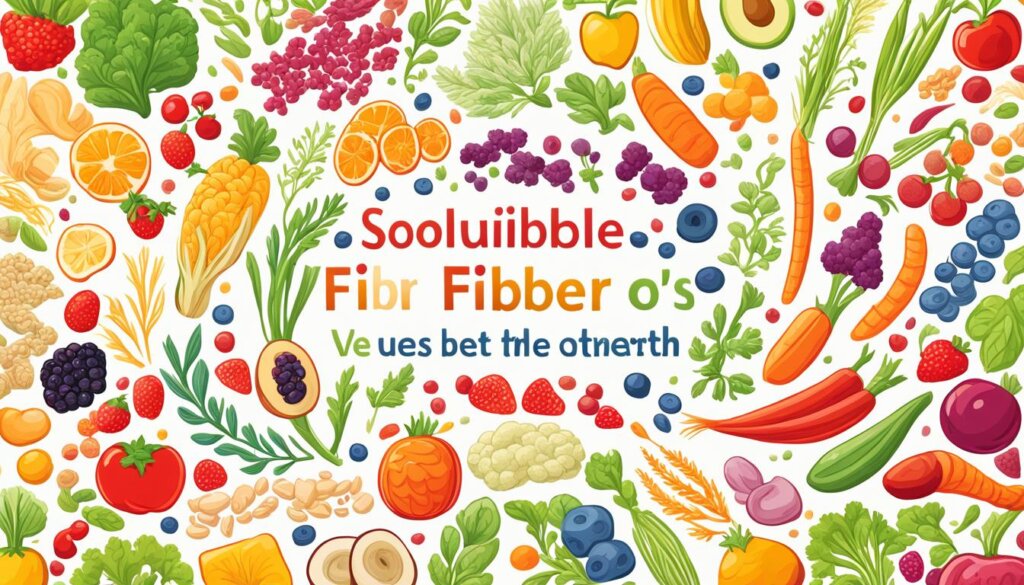
Fiber Type | Food Sources | Health Benefits |
|---|---|---|
Soluble Fiber | Oats, beans, lentils, fruits, vegetables | Helps regulate blood cholesterol and glucose levels |
Insoluble Fiber | Whole grains, nuts, seeds, vegetables | Adds bulk to stool, promoting regular bowel movements |
Eating a mix of fiber-rich foods helps support a healthy gut and lowers disease risk.
Top Fiber-Rich Foods for Gut Health
Eating a mix of high-fiber foods is great for a healthy gut. These foods include plant-based options, fermented foods, and spices good for your gut. They help your overall health.
High-Fiber Plant-Based Options
Legumes, whole grains, fruits, and veggies are full of fiber for your gut. Foods like beans, lentils, oats, apples, berries, broccoli, and asparagus are great. They feed the good bacteria in your gut.
Women need 25 grams of fiber a day, and men need 38 grams. But most in the U.S. and U.K. eat less than half that. Eating more fiber can really help your gut and overall health.
Fermented Foods and Gut-Friendly Spices
Fermented foods and some spices are also good for your gut. Foods like kimchi, sauerkraut, yogurt, and kefir have probiotics. These help your gut with good bacteria.
Spices like garlic and turmeric are also good for your gut. Adding these foods to your meals is easy and tasty. It helps keep your gut healthy.
“Trillions of microorganisms living in the intestines play a crucial role in overall health.”
Food | Fiber Content |
|---|---|
Artichokes | 47 grams per cup |
Leeks | 10 grams per item |
Onions | 9 grams per cup |
Raspberries | 6 grams per cup |
Cooked Beans | 6 grams per cup |
Asparagus | 5 grams per 5 spears |
Garlic | 3 grams per 6 cloves |
Bananas | 1 gram per medium banana |
Pears | 1 gram per fruit |
Watermelon | 1 gram per cup |
Adding high-fiber foods, fermented foods, and gut-friendly spices to your diet helps your gut and overall health. Choosing these fiber-rich and probiotic-rich foods is key for better gut health.
Increasing Dietary Fiber Intake
Eating more fiber is a great way to keep your gut healthy and boost your overall health. Women should aim for 25 grams of fiber a day, and men should aim for 38 grams. But most Americans only get about 16 grams a day. Here are some easy ways to eat more fiber.
Tips for Incorporating More Fiber
- Swap white bread for whole wheat bread or white rice for brown rice.
- Add nuts, seeds, and chopped veggies to your meals for extra fiber.
- Choose whole fruits over fruit juices to get more fiber.
- Eat foods high in fiber like avocados, almonds, chia seeds, pears, and beans.
Fiber supplements can help, but try to get fiber from whole foods when you can. Drinking enough water, about 48 to 64 ounces a day, helps your body use fiber better.
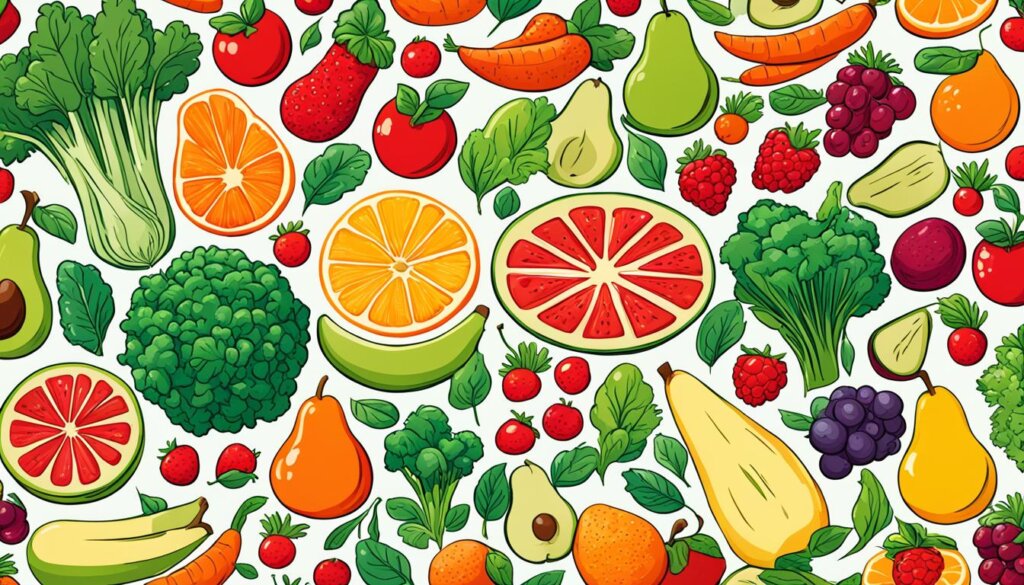
“Fiber is essential for a healthy gut, and incorporating it into your diet can have far-reaching benefits for your overall health.”
Just a few changes in your diet can boost your fiber intake. This supports a healthy gut microbiome, which is key for your health.
The Gut-Brain Connection
Research shows a deep link between your gut health and brain function, known as the “gut-brain axis.” Your gut has trillions of microorganisms. They help with making neurotransmitters, fighting inflammation, and boosting your immune system. These actions can greatly affect your mental health and how well you think.
The vagus nerve links your gut and brain together. Stress can slow down this nerve, showing how your gut and brain talk to each other. People with gut issues like IBS often have a weaker vagus nerve.
Your gut makes many compounds that help your brain stay healthy. For example, serotonin, which makes you feel good, comes from your gut, not your brain. Gut microbes also make GABA, which controls anxiety and depression, and SCFAs, which help with hunger.
Keeping your gut healthy is key for your overall well-being, including your mental health. “Psychobiotics” can help with stress, anxiety, and depression. Eating prebiotics, which feed good gut bacteria, can also boost brain health by lowering stress hormones.
To keep the gut-brain link strong, eat foods high in fiber, fermented foods, omega-3 fatty acids, and other good-for-your-gut foods. Taking care of your gut microbiome can make your brain healthier and improve your overall health.
Dietary Fiber Intake Trends | Key Findings |
|---|---|
United States | Fluctuations in dietary fiber intake, with an increase noted from 1999 to 2008 |
Europe | The European Food Safety Authority (EFSA) provided scientific opinion on dietary reference values for carbohydrates and dietary fiber in 2010 |
Ireland | The National Adult Nutrition Survey highlighted the dietary fiber intake of Irish adults, emphasizing the importance of understanding regional consumption patterns |
“Maintaining a healthy gut microbiome is crucial for supporting overall well-being, including mental and emotional health.”
Gut Health and Chronic Diseases
Research shows a strong link between gut health and chronic diseases. An imbalanced gut microbiome can lead to many health issues. This includes problems with the gut, metabolism, and even the brain, heart, and lungs.
In diseases like rheumatoid arthritis, people have fewer types of gut bacteria than healthy folks. They also have more Prevotella and less Faecalibacterium. Eating foods high in short-chain fatty acids can help reduce inflammation in these diseases.
Type 1 diabetes is also linked to gut health. Some gut bacteria are more common in people with this disease. Butyrate-producing bacteria are less common in kids with type 1 diabetes. Foods that make SCFAs can help protect against this disease.
Atopic eczema is also connected to gut health. People with this skin condition have different gut bacteria than those without it. Eating a diet rich in fiber and managing stress can help keep the gut healthy.
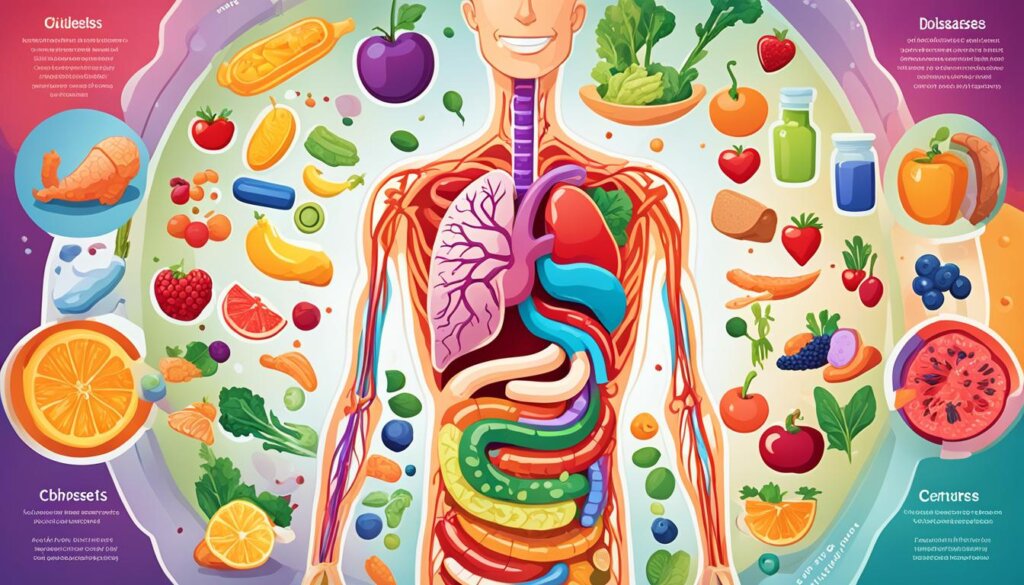
Indole is a compound made from tryptophan that affects our health. It makes up a big part of our tryptophan metabolism. High indole levels are linked to kidney disease, but ILA can protect against allergies. IPA is good for the gut and can lower diabetes risk.
Tryptophan metabolites like indole help control inflammation and protect against infections. But in kidney disease, indole can become a toxin. High levels of indole can also increase the risk of a gut infection.
Eating more fiber can help by reducing harmful byproducts in the gut and speeding up food movement. Fiber can also affect how our body uses tryptophan, making beneficial compounds.
More fiber in the diet can lower indole levels and increase good tryptophan metabolites. This means a fiber-rich diet can improve gut health and overall health.
“Dietary fiber may shift gut microbial metabolism to produce health-supporting metabolites.”
Dietary Fiber: Sources and Recommendations
Keeping your gut healthy is key for feeling good. Fiber sources, fiber requirements, and fiber intake guidelines help your gut microbiome thrive.
Adults should eat 25-38 grams of fiber each day, based on age and gender. You can get this by eating foods high in fiber like whole grains, fruits, veggies, legumes, nuts, and seeds.
- Artichoke has the most fiber in grains, with 9.6g and 89 calories per cup.
- Sapote or sapodilla is high in fiber too, with 9.5g and 217 calories per cup.
- High fiber, unsweetened cereal has 7.0g of fiber and 31 calories per 1/4 cup.
- Nance fruit has 4.2g of fiber and 82 calories per cup.
- Protein-rich wocas has 5.4g of fiber and 102 calories per ounce.
- Durian fruit has 4.6g of fiber and 179 calories per half cup.
- Popcorn has 5.8g of fiber and 169 calories in 3 cups.
Adults in the U.S. eat about 15 grams of fiber a day, which is less than needed. To meet fiber needs, eat a variety of high-fiber foods and find ways to increase fiber intake.
“Total dietary fiber intake should be 25 to 30 grams a day from food, not supplements.”
Eating more fiber-rich foods helps your gut, keeps you regular, and may lower disease risk. A balanced diet with fiber sources, fiber requirements, and fiber intake guidelines is key for gut and overall health.
Conclusion
Keeping your gut health in check is key for your overall health. It affects both your body and mind. Eating foods high in dietary fiber, managing stress, getting good sleep, and fixing food issues can help. Studies show that only a few people in the U.S. get enough fiber. But eating more fiber can lower the risk of heart disease.
Focus on gut health with a diet rich in fiber and a healthy lifestyle. A 2019 study showed that eating more fiber helped people lose weight and stick to their diets. Fiber also cuts down the risk of colon cancer. Soluble fiber lowers bad cholesterol and helps control blood sugar. Insoluble fiber prevents constipation and helps with regular bowel movements.
Make dietary fiber a big part of your diet to support a healthy gut microbiome. Eating foods like chickpeas, lentils, black beans, and avocados can help you get enough fiber. Aim for 25g a day if you’re a woman and 38g if you’re a man. But start slow and don’t eat more than 70g a day to avoid issues like bloating and gas.
FAQ
What is the gut microbiome and why is it important?
The gut microbiome is full of trillions of microorganisms like bacteria and viruses in our digestive tract. It’s key for our health, affecting our immune system, mental health, and disease risk. Keeping it healthy is vital for our bodies to work right.
What are the signs of an unhealthy gut?
An unhealthy gut might show as gas, bloating, or stomach pain. You might also gain or lose weight without trying, feel stressed, or have trouble sleeping. It can lead to food intolerances and increase disease risk.
How can I improve my gut health?
To boost gut health, try reducing stress, getting enough sleep, and drinking plenty of water. Eat mindfully and add prebiotics and probiotics to your diet. Managing food intolerances is also key.
What is the role of dietary fiber in gut health?
Fiber is crucial for a healthy gut. It comes in soluble and insoluble types. Eating enough fiber helps with digestion, protects the digestive system, aids in weight control, lowers cholesterol, and keeps blood sugar stable.
What are the top fiber-rich foods for gut health?
Great fiber sources include legumes, whole grains, fruits, and veggies like beans, lentils, and broccoli. Fermented foods and spices like garlic and turmeric also help gut health.
How much dietary fiber should I be consuming for optimal gut health?
Women should aim for 25 grams of fiber daily, men for 38 grams. Eat a variety of whole foods high in fiber to support a healthy gut.
How is gut health connected to overall health?
Gut health links closely to brain function, known as the “gut-brain axis.” It also affects chronic disease risk, like diabetes and some cancers. A healthy gut microbiome is key for well-being.
